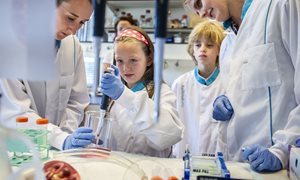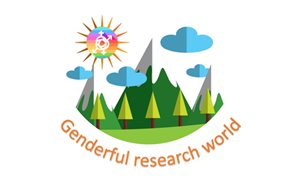Highlights

Our insights
Research with impact, that's what we stand for. We like to share our insights and results with the world around us. Where science and society meet, beautiful collaborations arise.

Richarda de Voer on colorectal cancer
Why do some people develop cancer at a very young age in life? With this question Richarda wants to make a difference for patients, together with fundamental and translational researchers, people in diagnostics and clinicians. Watch what they achieved in 2021!

One year of the Green Lab Initiative by Özlem Bulut & Estel Collado Camps
The Radboudumc Green Lab Initiative (GLI) took off. The path followed by the GLI is an excellent example of how bottom-up initiatives can sprout and grow. It shows that the commitment of the young researchers at RIMLS to a healthy future goes much further than their daily research activities. read more
Crowdfunding contributed to a breakthrough in the treatment of IgA nephropathy patients
Raphaël Duivenvoorden started a research project, which was made possible by crowdfunding, to unravel the cause of IgA nephropathy. IgA nephropathy is a slowly progressing disease that causes kidney damage and leads to kidney failure in about 25-50% of patients. read moreCrowdfunding contributed to a breakthrough in the treatment of IgA nephropathy patients
IgA nephropathy is a slowly progressing disease that causes kidney damage and leads to kidney failure in about 25-50% of patients. The reason why some people develop IgA nephropathy is unclear and there is no effective treatment.
Raphaël Duivenvoorden has now started a research project to unravel the cause of IgA nephropathy. It is of fundamental importance to gain a better understanding of the mechanisms leading to IgA nephropathy. The role of the gastrointestinal microbiome and immune cells in the bone marrow, are of particular interest for further research.
Therefore, in this research, Raphaël Duivenvoorden focuses on these two aspects to gain insight into how IgA nephropathy is caused. New insight into the cause of IgA nephropathy may contribute to the diagnosis of this disease and the development of targeted treatments.
The crowdfunding that make this research project possible was organized as part of the Radboud Fund.

ZonMw Gender in Research competition awarded to Genderful Research World Consortium
Natalia Valdrighi and Esmeralda Blaney Davidson won the competition to create a plan for the dissemination of the knowledge and skills gained during the Gender in Research workshop. read moreZonMw Gender in Research competition awarded to Genderful Research World Consortium
Natalia Valdrighi, from the group of Peter van der Kraan and Esmeralda Blaney Davidson, Inflammatory diseases, and colleagues were awarded with the Gender in Research Fellowship from ZonMw. This fellowship included a competition to create a plan for the dissemination of the knowledge and skills gained during the Gender in Research workshop amongst their peers, colleagues and institution with a reward of € 8,000 in prize money, financed by ZonMw and CIHR-IGH in Canada.
Currently, many great initiatives and key resources exists to support researchers on their quest to integrate sex and gender sensitivity into their health research. However, it remains difficult to find the right resources because many researchers aspiring sex and gender knowledge do not know where to start. Resource pages can be busy and overwhelming, and it can be difficult to identify the resources best suited to support your research.
With this funding, the Genderful Research World Consortium aims to develop a prototype for an interactive website with a curated list of existing relevant sex and gender resources for each key research phase to get scientists in health research with a novel interest in sex and gender started.
They will work on this project with an multidisciplinary and international team including researchers from the Radboudumc, Vrije Universiteit, ErasmusMC and University of British Columbia.

Rare and complex urology: Clinical overview of ERN eUROGEN
Wout Feitz and colleagues published in ‘European Urology’ about the impact of a European Reference Network (ERN) for rare diseases in urology. read moreRare and complex urology: Clinical overview of ERN eUROGEN
Wout Feitz and colleagues, Reconstructive & regenerative medicine, publish an article in European Urology, which provides an overview and identifies challenges in collecting data at the European level from the ERN eUROGEN patient population.
Background
In 2017, the European Commission launched 24 thematic European Reference Networks (ERNs). Radboudumc participates in 14 networks and two of these networks are coordinated by Radboudumc: ERN GENTURIS and ERN eUROGEN.
ERN eUROGEN is the network for urorectogenital diseases and complex conditions, and started with 29 full member healthcare providers (HCPs) in 11 countries. It then covered 19 different disease areas distributed over three workstreams (WSs).
Objective
To provide an overview and identify challenges in data collection at European level of the ERN eUROGEN patient population treated by HCPs in the network.
Design, setting, and participants
A retrospective cohort study was conducted of the 29 HCPs who were full members between 2013 and 2019.
Outcome measurements and statistical analysis: Data were extracted from the original HCP applications and the ERN continuous monitoring system. Patient volumes, new patient numbers, and procedures were compared between different WSs, countries, and HCPs. Discrepancies between monitoring and application data were identified.
Results and limitations
Between 2013 and 2019, 122 040 patients required long-term care within the 29 HCPs. The volume of patients treated and procedures undertaken per year increased over time. Large discrepancies were found between patient numbers contained in the application forms and those reported in the continuous monitoring system (0-1357% deviation).
Conclusions
Patient numbers and procedures increased across ERN eUROGEN HCPs. Reliable data extraction appeared challenging, illustrated by the patient volume discrepancies between application forms and the continuous monitoring data. Improved disease definitions, re-evaluation of affiliated HCPs, and valid data extraction are needed for future improvements.
.aspx?width=4000&height=2670&ext=.jpeg&type=BlockColumn1Zoom1)
Frans Russel appointed member Supervisory Committee of RIVM
Frans Russel, Renal disorders, has been appointed by The Minister of Health, Welfare and Sport (VWS). read moreFrans Russel appointed member Supervisory Committee of RIVM
The Minister of Health, Welfare and Sport (VWS) has appointed Frans Russel, Renal disorders, as member of the Supervisory Committee of the Dutch National Institute for Public Health and the Environment (RIVM).
RIVM is a knowledge and research institute dedicated to promoting public health and a healthy and safe living environment. The legal task of the Supervisory Committee is to monitor the scientific quality and integrity of RIVM. The Committee reports annually to the Ministry of VWS.







